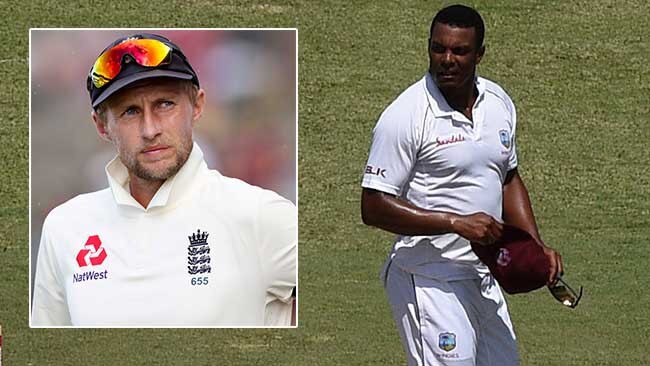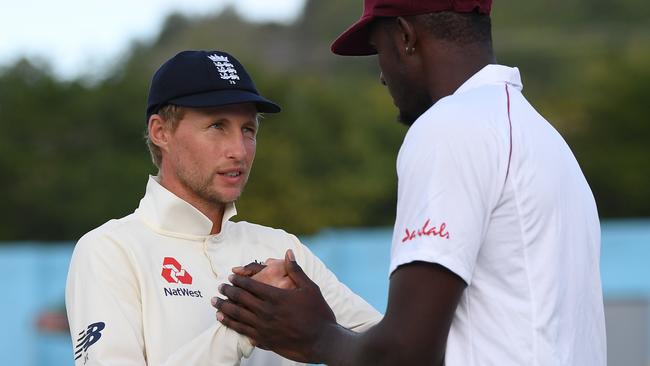Joe Root cops homophobic slur from West Indies bowler Shannon Gabriel
A homophobic slur aimed at England skipper Joe Root during the West Indies Test series produced some unexpected fallout.

“There is nothing wrong with being gay.”
These words were spoken by Joe Root, the England cricket captain, during the third Test, in St Lucia. They were not offered for public consumption. This was not a sportsman brandishing his right-on credentials on Twitter. He was not doing it in association with a brand. He was merely responding to what one assumes was a homophobic insult from the fast bowler, Shannon Gabriel. It was natural, organic and, in a certain sense, rather wonderful.
The words will certainly make an impact in St Lucia, where male homosexuality is illegal and can carry a ten-year prison sentence. It may make something of an impact, too, in Antigua & Barbuda, Barbados, Dominica, Grenada, Jamaica, St Kitts & Nevis, and St Vincent & the Grenadines, where male homosexuality is also illegal. The penalties are not officially enforced but they still carry the imprimatur of the state.
Gabriel was warned about his language by the on-field umpires Rod Tucker and Kumar Dharmasena, who later decided to lay a formal charge against the 30-year-old.
It will be adjudicated on in the first instance by ICC match referee Jeff Crowe.
Root, who suggested on the third evening that Gabriel “might regret” his choice of words, did not want to shed further light on the incident after England’s 232-run victory but was more than happy with his own part.
In St Lucia, there is no recognition of same-sex relationships, no provision for same-sex marriage, adoption is prohibited for same sex-couples, and it is still legal to discriminate against people on the grounds of their sexual orientation. In Antigua & Barbuda, Barbados, Dominica, the Dominican Republic, Jamaica, St Kitts & Nevis, and Trinidad & Tobago it is illegal for openly gay people to serve their nation in the military.
This is not intended as a blanket criticism of the great nations of the Caribbean, for such laws are not in the least bit unrepresentative. Gay people today live in hiding, and often in fear, in much of the world, including in Russia, Africa, and across the Middle East. Not long ago Tom Daley, the British former world champion diver, said: “It can be scary going to countries that aren’t accepting of LGBT people. I’ve competed in the Middle East, Russia, and parts of the Commonwealth, where being gay is punishable.”
Some people will doubtless say that the world is changing, to give things a bit of time, but I am not sure if that is of immediate comfort to those suffering persecution. One certainly wonders if the ICC feels a little conflicted on giving a lead in this area given that homosexuality is illegal in so many of its member nations, including the United Arab Emirates, Pakistan, Sri Lanka and, up until last year, India. Although the ICC has a code of conduct on racism, there is nothing yet on homophobia. Perhaps it is just coincidence that the ICC’s headquarters is in Dubai, where being gay is criminalised.
But let us get back to Root because I, for one, found his comments glorious. They reminded me of listening to Steven Everson, then a brilliant young philosophy don, in a debate on gay rights at the Oxford Union circa 1991. One of the students launched a scathing attack on gay couples adopting, on same sex marriage, and defended Section 28, which banned the “promotion” of homosexuality by local authorities and in schools and was repealed in Scotland in 2000 and the rest of the UK three years later. I expected a sharp response from Everson, perhaps an all-out attack. Instead, he merely looked concerned. “Are you OK?” he said to the student. “If you want to chat afterwards, I’m here.”
Perhaps I am reading too much into it, but Root’s comments seemed to emerge from the same, humane attitude. His incomprehension at the issuing of a homophobic insult, his perplexity, articulates something stronger than outrage, more meaningful than protest. What the hell is wrong with being gay? Why would you suppose that such an insult may offend me? Why defame a facet of another person’s identity? Is it you who needs help?
I don’t know who said what to whom .. but boy do I applaud Joe Root’s reaction here . For me his twelve words as a role model will be in the end more important than a test hundred or possible victory. https://t.co/QMDHhO3VAC
— Nasser Hussain (@nassercricket) February 12, 2019
The broader history of persecution of gay men should never be overlooked. We all know about the castrations, the public beatings, the social exclusion. We all know about the tragedy of Alan Turing, forcibly injected with diethylstilboestrol, a synthetic oestrogen, to avoid jail for “gross indecency” in 1952. The chemical castration had its own effects, predicted by Turing. “No doubt I shall emerge from it all a different man, but quite who I’ve not found out,” he wrote. He committed suicide in 1954, a war hero pivotal to the victory over Nazi Germany after being instrumental in breaking the Enigma code, but one of so many whose lives were vandalised by prejudice.
From this vantage point, we have moved on a long way, but are we really near the end of the journey? I remember chatting to John Amaechi, the former NBA basketball player, about his career. From afar, it looked as if he was living the dream, earning millions and playing to packed houses, and yet he never felt able to come out. The culture was too repressive, too virulently homophobic.
“There was an explicit distaste for ‘fags’,” he has said. “Once on the team bus I noticed a billboard that said, ‘Someone you know is gay’. I waited to hear what the guys would say. One said, ‘If my kid grew up gay, I’d throw him into the street’.”

One thinks, too, of the horrendous treatment meted out to Justin Fashanu, including by his Nottingham Forest manager Brian Clough (Fashanu committed suicide in 1998); of the homophobia endured by Graeme Le Saux, despite being straight and married; of the words of Luiz Felipe Scolari, who coached Chelsea and was in line for the England job in 2006, who publicly stated: “If I found out one of my players was gay I would throw him off the team.”
This is not ancient history. And it should make us at least somewhat suspicious of the self-congratulation that often permeates debates on contemporary gay experience, particularly within sport. We like to point to Gareth Thomas, the former Wales rugby union captain, and to Steven Davies, the Somerset batsman, but rarely wonder why they remain the only out gay men in their respective sports. We point to Thomas Hitzlsperger, who played 52 times for Germany but only opened up about his sexuality after retiring from football, but rarely talk about the fact that, across the entire history of the professional game in England, no active player has come out.
Root, who is married with a young son, was gracious when asked about the incident. “Sometimes things are said on the field but they should stay on the field,” he said. “Sometimes you get caught in the moment and do not always say what you want to say or think you’re saying.” I am not sure if I quite agree on the specific point. After all, why should players have to endure any kind of gratuitous insult on the field of play, effectively their place of work? I despair of sledging, in all its manifestations.
As for Root’s off-the-cuff response to whatever Gabriel said, it was nothing less than wonderful. It cut to the heart not just of homophobia but of all arbitrary prejudice, of whatever kind. Why? Just why?
The Times




